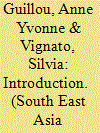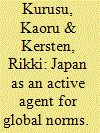|
|
|
Sort Order |
|
|
|
Items / Page
|
|
|
|
|
|
|
| Srl | Item |
| 1 |
ID:
117834


|
|
|
|
|
| Publication |
2012.
|
| Summary/Abstract |
This article provides a working taxonomy of the concept of 'alignment' in the discipline of International Relations (IR); a heretofore major deficiency in the otherwise abundant literature on alliance/alignment. It further contends that the label 'alliance' is commonly employed reflexively and unreflectively, where in fact the term 'alignment' would be a superior and more accurate descriptor. This contention is buttressed by empirical developments in international politics. The article makes the case that the contemporary security environment is characterised by multiple forms of 'alignment', not just alliances, in their many guises. In addition, we can identify 'coalitions', 'security communities', and 'strategic partnerships'; all distinctly different from the conventional 'alliance' archetype. It concludes that a change in our thinking about defining and conceptualising alignment and alliance is required to bring disciplinary work closer in line with the paradigmatic shift that is occurring in contemporary international politics.
|
|
|
|
|
|
|
|
|
|
|
|
|
|
|
|
| 2 |
ID:
128739


|
|
|
|
|
| Publication |
2014.
|
| Summary/Abstract |
In this article I view Asian alliances as a product of universal security needs and culturally constructed variables. While the alliance remains one of the fundamentals of contemporary international politics, I attempt to show through comparative analysis of the Sino-Soviet alliance and the Japan-US security alliance how subtle differences of national developmental experience can significantly affect political outcomes in East Asia.
|
|
|
|
|
|
|
|
|
|
|
|
|
|
|
|
| 3 |
ID:
126586


|
|
|
|
|
| Publication |
2013.
|
| Summary/Abstract |
Using the 'achievement index', a country's relative size of gross domestic product divided by its relative size of population, I argue that the high-achieving position of the West, as a structural distortion, has been a principal source of instability in the modern international system. Rather than being just unsatisfied great powers, large high achievers and stagnant low achievers engage in hegemonic and counter-hegemonic warfare, respectively. Both hierarchy and balancing systems are structurally more stable if they are 'natural' and less stable if they are 'unnatural', with being natural defined as an achievement index of 1. The rise of the rest constitutes a long-term trend back to nature, beginning to flatten the heretofore skewed international structure, which lessens one source of modern system-level instability. With a much larger share of world population, China cannot rise to the same relative height as the West that rose with a much smaller share of the population. China's rise is thus unlikely to repeat the past experience of the rising West.
|
|
|
|
|
|
|
|
|
|
|
|
|
|
|
|
| 4 |
ID:
114564


|
|
|
| 5 |
ID:
128881


|
|
|
|
|
| Publication |
2013.
|
| Summary/Abstract |
This Special Focus is the second part of 'Life after collective death in South East Asia', a collection of papers examining what happens after wide-scale destruction has occurred and how the social and individual lives of the survivors recover. Part 1, published in South East Asia Research in June 2012 (Vol 20, No 2), focused on the social and religious processes that help the '(re-)fabrication of social bonds'. Part 2 deals with another major aspect of resilience - the issue of help, especially in the case of international humanitarian aid. In many ways, in the contemporary situation, it is taken for granted that help will be provided. We question the evidence for this, asking what rationales are involved in post-catastrophe help. We shed light on why, for example, people decide to engage in non-governmental organizations (NGOs) to help distribute drugs in a Cambodian outpatients ward or, alternatively, to carry rice sacks in the Ayeyarwady Delta to help victims of the typhoon in Myanmar. We highlight why people in the West consider such activities 'normal'. We focus on how people, having been labelled as 'victims', receive and perceive such aid and how they respond to it. Further, we ask how (and to what extent) aid contributes to change, implicitly or explicitly, in the societies affected. Finally, we question what contemporary international aid brings when compared to the older local relief systems and systems of mutual help, particularly those examined in Part 1.
|
|
|
|
|
|
|
|
|
|
|
|
|
|
|
|
| 6 |
ID:
110902


|
|
|
|
|
| Publication |
2011.
|
| Summary/Abstract |
Japan has shaped a distinct human security policy based on evolving policy preferences of successive domestic political leaders and the gradual assimilation of external norms into its own foreign policy. Independent experts have played a particularly significant role in advising Japanese policy elites on how human security could be used by Japan to become an "intellectual leader" within the United Nations and other relevant institutions. This article explores those processes that occurred in the early phase of norm acceptance on the part of key Japanese policy actors and change agents in Japan from the late 1990s through 2003. It argues that human security has served as an effective approach for Japan to establish itself as a more independent foreign policy actor in contemporary international politics.
|
|
|
|
|
|
|
|
|
|
|
|
|
|
|
|
|
|
|
|
|